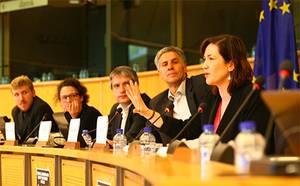Lobbying, Corruption and Lack of Transparency in the EU
the Dark Side Of Democracy?

Speaker presentations (PDFs)
- For more transparency and accountability in politics - Keno Franke
- The firepower of the financial lobby – Olivier Hoedeman
- The lessons of the Dalli Case - Luk Joossens
- Lobbying, corruption and lack of transparency in the EU – the dark side of democracy? - Natacha Cingotti
- Have the Transparency Register and other efforts for better control of lobbying in the EU institutions brought the results we need? - Mark Perera
- Privacy and efficiency as dark sides of democracy - Staffan Dahllöf
PRESENTATION Heading towards the EP elections, the legitimacy crisis of the EU keeps deepening and drives millions of voters towards anti-EU parties. To regain the trust of citizens for the European integration project we have to enforce a clean and transparent legislative process as well as an effective democratic control of the executive. During the past legislature, the European Parliament has made important steps towards a more open, citizen-friendly and democratic EU. The joint Transparency Register of Parliament and Commission is the first tool for regulating the armies of paid lobbyists in Brussels. Much remains to be done, though, both on EU and Member State level, before we can call this register a truly effective instrument. Following the scandals with corrupt parliamentarians, a new Code of Conduct for MEPs improved transparency and drew clear red lines in conflict of interest cases. However, the first cases the newly installed Advisory Committee had to deal with already showed the limits of the Code. The EP's growing responsibility made it essential for MEPs to be able to consult classified documents. Agreements with Council and Commission brought manifest improvements for the EP’s ability to exercise democratic control, for example in international negotiations such as ACTA or TTIP. NGOs fighting for better access to legislative and administrative documents for the public have scored important victories. However, there is still a long way to go, especially in enforcing the new rights. Ultimately, we need to keep on fighting for a robust legal base for such rights instead of less enforceable agreements. During our conference, we want to compile a comprehensive picture of current methods of converting economic power to political influence. Then, we want to look at effective instruments to reduce the impact of "dark lobbyism" on public policies – both at European as well as Member State level. Our special focus will be on analysing how recent initiatives to improve transparency in the EU have performed and what we should demand in order to improve them. PROGRAMME 15:00 Conference opening: José Bové, MEP (Greens/EFA) 15:15 Session 1: How does lobbying in the European Union impact legislative processes, democratic accountability and international negotiations? Chair: Indrek Tarand, MEP (Greens/EFA)
- Fergal Ó Regan (European Ombudsman’s Office): What can the Ombudsman do to improve transparency in the EU’s institutions?
- Olivier Hoedeman (Corporate Europe Observatory): How strong is the grip of lobbies on the EU? What can we do to make lobbying more transparent?
Download the report "The fire power of the financial lobby - A survey of the size of the financial lobby at the EU level" - Luk Joossens (Association of European Cancer Leagues): The Commission as puppet of invisible lobbies? What did we learn from the Dali case?
- Staffan Dahllöf (wobbing.eu): Hunting down corrupt politicians and public officials – how difficult is investigative journalism in the EU?
16:45 Session 2: How did institutional solutions to control special interest lobbying perform so far and how could they be improved? What other instruments could political initiatives and civil society use to improve transparency? Chair: Gerald Häfner, MEP (Greens/EFA)
- Mark Perera (Transparency International): Did the Transparency Register and other efforts for better control of lobbying in the EU institutions bring the results we need?
- Natacha Cingotti (Friends of the Earth Europe): Did the Code of Conduct for MEPs reduce the likelihood of corruption in the EP?
- Helen Darbishire (Access Info Europe): Is the EU on a good track to make political decision making and public administration transparent by ensuring broad access to documents?
- Keno Franke (abgeordnetenwatch.de): How can citizens control the work of their elected representatives?
- Sven Giegold, MEP (Greens/EFA): Are there ways to make the link between lobby documents and proposals by the Commission and MEPs more visible?
18:30 END






